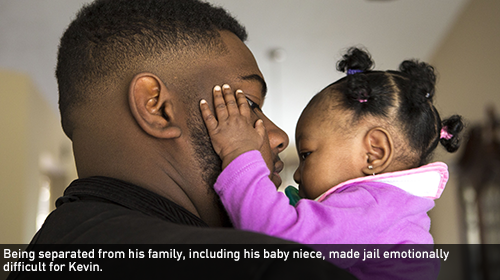Poverty Is Not a Crime, Whether You Live in DeKalb County or Ferguson or Anywhere Else


Kevin Thompson, a black teenager in Georgia, was jailed for five days in December 2014 because he could not afford to pay court-ordered fines and company fees related to a traffic ticket.
In January, the └Ž░─├┼┐¬Į▒Įß╣¹, the └Ž░─├┼┐¬Į▒Įß╣¹ of Georgia, and the Southern Center for Human Rights filed a federal lawsuit against DeKalb County, Georgia, and for-profit company Judicial Correction Services Inc. on his behalf. Yesterday, less than two months after the filing, we reached a settlement that promises to prevent others from being improperly jailed for being poor in DeKalb County.
This settlement could not have come at a more important time. More than 30 years ago, the Supreme Court ruled that debtorsŌĆÖ prisons are unconstitutional. Yet, as described in the Thompson v. DeKalb County complaint and the on FergusonŌĆÖs law enforcement, courts in Missouri and across the country lock people up when they cannot afford to pay fines and company fees arising from traffic tickets and other minor offenses.
But efforts to generate revenue by targeting this vulnerable group ŌĆō people too poor to pay fines and fees for low-level crimes on sentencing day ŌĆō have had a devastating impact on communities of color and have led to the violation of peopleŌĆÖs constitutional rights to fair treatment and equal protection of the law. The settlement achieved in Thompson v. DeKalb County promises to forge a new path in DeKalb County and provide a model for other courts to follow. The chief judge of the court that sentenced Thompson to jail agreed to take measures to protect the rights of people who cannot afford to make fine and fee payments required as a condition of probation for traffic and other misdemeanor offenses.
These policy changes include:
- Adoption of a ŌĆ£bench cardŌĆØ that provides judges procedures to follow to help make sure that poor people charged with failure to pay are afforded lawyers and are not jailed simply because of their poverty. The card lists the legal alternatives to jail and describes how to determine someoneŌĆÖs ability to pay and to protect their right to counsel in court proceedings concerning failure-to-pay charges.
- Training and guidance to court personnel on probationersŌĆÖ right to counsel in revocation proceedings and right to an indigency hearing before jailing for failure to pay fines and fees.
- Revision of forms to let people charged with failure to pay know of their right to court-appointed counsel in probation revocation proceedings, and their right to request a waiver of any public defender fees they cannot afford.
Following the filing of Thompson v. DeKalb County, the Georgia General Assembly entirely abolishing the court that sentenced Thompson to jail by July 1, 2015, and transferring its cases to two other courts in DeKalb County. The policy reforms achieved in this settlement will apply in the interim period to judges in whatever capacity they are adjudicating misdemeanor probation cases in DeKalb County. They will also set an example for how the courts inheriting these cases can protect the rights of poor people who cannot afford to pay court-ordered fines and company fees related to a traffic tickets and other misdemeanor offenses.
In a previous blog post about his lawsuit, Thompson movingly wrote about the shame, pain, and fear he felt from being jailed and separated from his family for failure to pay traffic fines and probation company fees he could not afford. Under the settlement agreement, the defendants will also provide Thompson a monetary payment.
Being poor is not a crime. The Supreme Court made that clear decades ago. By standing up for his rights, Kevin Thompson has shown that this principle remains true today. In the process, he has helped to bring about promising changes to prevent debtors prisons in his home county so that others do not experience what he went through.
And for that, we are all grateful.
